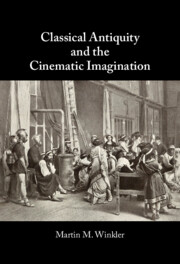Book contents
- Classical Antiquity and the Cinematic Imagination
- Classical Antiquity and the Cinematic Imagination
- Copyright page
- Dedication
- Contents
- Illustrations
- Preface
- I Prolegomena
- II Progymnasmata: Ways of Seeing
- III Complex Cinematism
- IV The Cinema Imagines Difficult Texts
- Chapter 10 Apollonius and the Golden Fleece; or, The Case of the Missing Ecphrasis
- Chapter 11 Arrow and Axes in the Odyssey; or, The Case of the Insoluble Enigma
- Chapter 12 Peckinpah’s Aristotle; or, How Well Does The Wild Bunch Fit The Poetics?
- V Epilegomena
- Bibliography
- Index
Chapter 12 - Peckinpah’s Aristotle; or, How Well Does The Wild Bunch Fit The Poetics?
from IV - The Cinema Imagines Difficult Texts
Published online by Cambridge University Press: 15 February 2024
- Classical Antiquity and the Cinematic Imagination
- Classical Antiquity and the Cinematic Imagination
- Copyright page
- Dedication
- Contents
- Illustrations
- Preface
- I Prolegomena
- II Progymnasmata: Ways of Seeing
- III Complex Cinematism
- IV The Cinema Imagines Difficult Texts
- Chapter 10 Apollonius and the Golden Fleece; or, The Case of the Missing Ecphrasis
- Chapter 11 Arrow and Axes in the Odyssey; or, The Case of the Insoluble Enigma
- Chapter 12 Peckinpah’s Aristotle; or, How Well Does The Wild Bunch Fit The Poetics?
- V Epilegomena
- Bibliography
- Index
Summary
Aristotle’s concept of tragic catharsis in The Poetics is one of the most controversial topics in classical literature. It has repeatedly been adduced to describe the emotional impact of explicit screen violence, especially in the films of Sam Peckinpah. Peckinpah initially justified the graphic violence in some of his films with Aristotelian catharsis but later reversed himself. This chapter presents a vindication of Peckinpah’s original understanding of catharsis in connection with his best-known film. The Wild Bunch was one of the most controversial works of its time but later became an acknowledged masterpiece of American cinema. The chapter reviews current classical and film scholarship on catharsis and adduces Euripides’ tragedy The Bacchae as an ancient parallel to Peckinpah’s film regarding cathartic violence. The destructive ecstasy of Greek Maenadism even finds a specific expression in The Wild Bunch. Finally, the chapter interprets the film’s protagonist as a tragic figure.
Keywords
- Type
- Chapter
- Information
- Classical Antiquity and the Cinematic Imagination , pp. 430 - 456Publisher: Cambridge University PressPrint publication year: 2024



